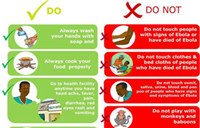After that, the infected person takes a turn for the worse. There is impairment of kidney and liver functions, and in some cases, both internal and external bleeding. What causes death isn't usually the bleeding through urine, stool, eyes or mouth, but the blood vessels that start leaking fluids causing blood pressure to fall so low that heart, kidneys, liver and other organs stop working.
Treatment
|
 |
|
 |
|
Chinese medical supplies arrive in Ebola-affected Sierra Leone |
Although there is no known cure, many pharmaceutical companies, including China's Sihuan Pharmaceutical Holdings Group Ltd, are testing drugs that promise a breakthrough.
Authorities are also evaluating a range of potential treatments, including blood products and immune therapies. Until a cure is found, reducing contact with infected bats and apes, thoroughly cooking animal meat, minimizing contact with infected humans, especially their body fluids, community mobilization, tracing of infected people and safe burial are some of the measures that can help in containing the outbreak.
Myths
One of the biggest myths circulating is that the virus can spread through the air. It cannot. The disease primarily spreads through blood, saliva and vomit. It's not yet confirmed whether a person can catch Ebola through contact with sweat.
The virus usually infects a healthy individual when they touch somebody who has the symptoms and then touch their mouth or nose or an open wound. Apart from direct contact through blood or sex, another way somebody can get infected is when a patient sneezes and saliva gets into the eye.
The second myth is that eating raw onions, drinking condensed milk or salt water can stop the virus. While eating nutritious food is good for health, raw onions or salt water cannot prevent transmission of the infection.
Third is that the death rate is 90 percent. It's true that in one region in Africa, about 90 percent of infected people succumbed to the disease, but in all other areas the death rate is much lower – 25 percent in one instance.
Another myth is that Ebola is the most dangerous disease in the world. People are more likely to die of HIV/AIDS, malaria, respiratory infections and diarrhea than Ebola. One of the main reasons why it's unlikely to become a mass killer is that the virus spreads only through direct contact with blood, saliva or sweat. Contracting this disease is harder than catching measles.
Finally, that there's a cure but it's being kept secret. There is currently no shot or pill that can cure this disease. Experimental drugs have been tried on humans, but are available only in small quantities and have not yet been approved by regulators.
So, while Ebola has left more than 4,500 dead and infected thousands others, it's unlikely it will prove to be as devastating as other big killers. Many countries, including China, are better prepared at handling major outbreaks and have already taken measures to contain it.
Taking steps that minimize the risks is better than panicking over something that has less chance of killing than dengue.
